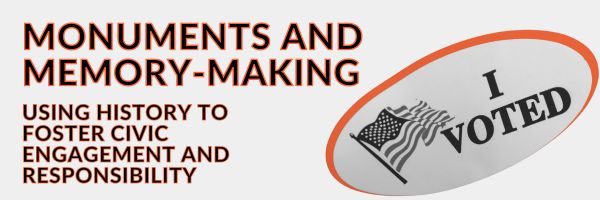
Becca Livingstone
Professor of History
Simpson College
I assigned Monuments and Memory-Making in my Fall 2022 First-Year Seminar course, which centered on the theme of Civic Engagement. I, as a historian, naturally gravitate towards thinking about such things historically. As Abby discussed last week, the contest over how we frame, construct, and teach our national history is a central issue in today’s politics. The very crux of these debates – what history do we tell, celebrate, exclude, and decry – are defined by who is involved in the conversation.
These are big, complicated questions. Understandably, most students of mine were not particularly interested in exploring these questions; they were busy navigating their first semester in college, figuring out how to be college students, how to fit in, and how to make a good impression on their peers. In fact, many of my students expressed a distinct reluctance to discuss anything remotely ‘political’ because of how divisive and uncivil those conversations have become. There was resistance to civic engagement at precisely the time when they were coming of age to be able to vote. Is there any wonder why with the current hyperpolarization in the country? But this is what makes the college classroom space all that more important. Where else can our young people learn the tools for how to discuss contentious issues if not in our classrooms? How else can we help them figure out how to not only disagree with respect, but also listen to other viewpoints, engage in meaningful discussion, and build consensus about how to move forward together?
Monuments and Memory-Making provided an interesting point of entry for my students to explore the issues in our current political debates about history without directly engaging in the politics that made them resistant. It’s topic – the Vietnam War and the 1980s controversy over the memorial’s design – is far enough away that it didn’t directly touch their lives or outlooks. The game became a less contentious space for them wrestle with the questions of: Who are we as a nation? How do we deal with uncomfortable and (in many cases) shameful parts of our history? How do we come to terms with the reality of history and its actors both holding and acting upon beliefs and values that are antithetical to our modern world? What does this all mean for who we are as a nation today? By setting these questions in the world of the early 1980s, students more easily engaged with the divergence in perspectives framed by different experiences, allowing them to more readily explore the negotiated nature of historical memory.
The experience of playing the game left them with the crucial question of ‘why should this matter to them beyond the classroom space?’ This is where the debriefing session became critical; it was the place where we made the connections between the game and our present. First, we discussed how the game demonstrated the power and the impact that everyday people, just like themselves, have on the creation of historical memory. The interaction of roles opened students up to thinking about how people today can have such divergent understandings of American history. To complete the ultimate task of the game, students had to figure out how this disparate group of people could (or couldn’t) come together to achieve a consensus of what it meant to be American. This then served as a springboard for us to consider how these questions are alive today and why they matter to all of us.
We as a nation are still trying to figure out who we are now and who we want to be. It should not be the voices of the few or the powerful that decide the vision of the past, present, and the future of our nation; rather it should be the voice of the many, the people. The stories that we lift up and give voice to matter. Through this experience, my students began to think about how historical memory is constructed by various competing voices, both big and small, that mostly have nothing to do with historians or the professional discipline. Instead, it is ordinary people, just like them, who ‘make’ a nation’s historical memory. The game served as a lesson in civic responsibility and empowerment. It also showed them how to engage in civil discourse about things that matter deeply to people. Two things, which our present state of politics are sorely in need of.


